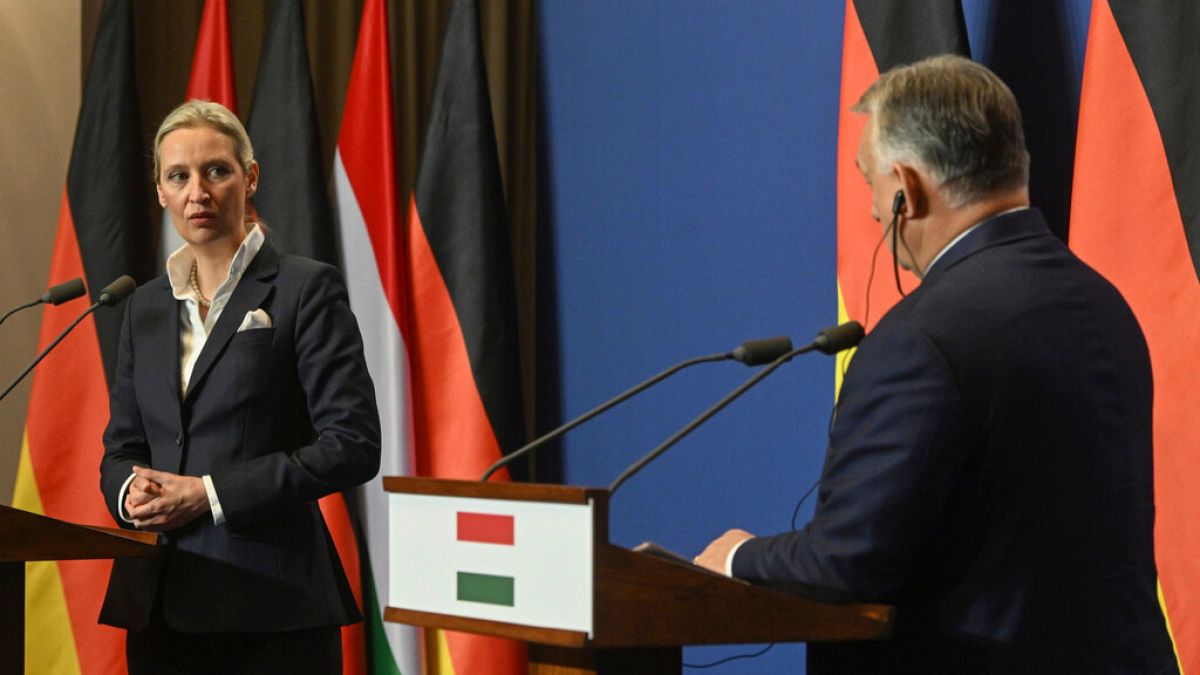Europe
AfD chief and Hungary’s Orbán bond over migration in Budapest

The Rise of the AfD: A Far-Right Force in German Politics
The Alternative for Germany (AfD) has emerged as a significant political force in the run-up to the country’s federal elections scheduled for February 23. Currently polling in second place, the party has managed to carve out a niche for itself by capitalizing on voter discontent, particularly on issues like immigration and European Union policies. However, despite its growing popularity, the AfD remains isolated, as all other major political parties in Germany have ruled out forming a coalition with it. This isolation is largely due to the party’s far-right stance, which has drawn criticism both domestically and internationally. The AfD’s rise has also sparked debates about the future of German politics and the potential shift toward more nationalist and euroskeptic policies.
Orbán and Weidel: A Shared Vision for Europe’s Migration Policy
In a move that has raised eyebrows across Europe, Hungary’s Prime Minister Viktor Orbán recently hosted Alice Weidel, the co-leader of the AfD, in Budapest. The meeting was seen as a show of solidarity between two political leaders known for their hardline positions on immigration. Orbán, who has long been a vocal critic of the EU’s migration policies, praised the AfD’s approach, suggesting that its policies would benefit Hungary. During a joint press conference, both leaders called for stricter migration laws and a more controlled approach to asylum seekers. Weidel, who is the AfD’s candidate for chancellor, described "uncontrolled migration" as a source of "imported crime" and praised Hungary for being a "bulwark" against illegal migration. Orbán, meanwhile, emphasized the need for the EU to strengthen its border controls and ensure that asylum requests are made outside of the EU.
A Hardline Stance on Migration and EU Policies
The AfD and Orbán’s Fidesz party share a common stance on migration, advocating for stricter controls and tougher laws to manage the flow of migrants into Europe. Orbán has been a consistent critic of the EU’s migration policies, arguing that they are insufficient to protect member states from the perceived threats of mass migration. Hungary has been at odds with the EU over these issues, including a recent fine of €200 million imposed by the European Court of Justice for failing to comply with EU-wide migration policies. Weidel has also been vocal in her criticism of the EU’s approach, calling for a comprehensive reform of the bloc. She has argued that Brussels should cede more power to national parliaments, allowing member states to have greater control over their own migration policies.
Weidel’s Vision for EU Reform and Leadership
Alice Weidel has been a vocal advocate for a radical overhaul of the EU, arguing that the bloc has become too bureaucratic and ineffective in addressing key challenges. She has called for a significant reduction in Brussels’ powers, proposing that decision-making should be decentralized and handed back to national parliaments. Weidel has also criticized the EU’s leadership, particularly European Commission President Ursula von der Leyen, for failing to provide strong leadership on issues like migration and trade. In a thinly veiled dig at von der Leyen, Weidel suggested that the EU is "leaderless" when it comes to dealing with external pressures, such as tariff threats from the United States. She emphasized the need for Europe to have a strong negotiating presence on the world stage, arguing that the current bureaucratic structure is hindering the EU’s ability to act decisively.
Orbán’s Ambitions for Europe: A Call for Stronger Leadership
Viktor Orbán, who has long been a key figure in the European far-right, has also weighed in on the future of the EU. While acknowledging that Hungary, as a smaller member state, cannot single-handedly shape the EU’s trajectory, Orbán has called for stronger leadership from the bloc’s major powers, particularly Germany and France. He has argued that these two countries have the political and economic clout to steer the EU out of its current "crisis." Orbán’s comments reflect his broader vision for Europe, which prioritizes national sovereignty and a more muscular approach to migration and border control. His meeting with Weidel was seen as part of an effort to build alliances with like-minded leaders and parties across the continent, as he seeks to influence the direction of the EU from within.
The AfD’s Electoral Prospects and the Challenges Ahead
Despite its strong polling numbers, the AfD faces significant challenges in the upcoming German elections. All major parties, including the Christian Democratic Union (CDU), the Social Democratic Party (SPD), and the Greens, have ruled out forming a coalition with the AfD, effectively isolating it in the Berlin political landscape. Weidel has dismissed the likelihood of a coalition with these parties, predicting instead that the election will result in an "unlawful" alliance between the CDU, SPD, and Greens. She has criticized CDU leader Friedrich Merz for his inability to deliver on key migration policies, arguing that voters disillusioned with the CDU will turn to the AfD as an alternative. However, the AfD’s electoral success may be tempered by its lack of potential coalition partners, raising questions about its ability to influence policy even if it performs well at the polls.
The AfD’s rise has also drawn attention from unexpected quarters, including South African-born tech billionaire Elon Musk. Weidel was recently invited to an online chat on Musk’s X platform, and the Tesla CEO has publicly expressed his support for the party. While this level of international attention is unusual for a European far-right party, it has also caused controversy, with critics accusing Musk of legitimizing extremist views. The AfD’s connection to Musk has further polarized opinions about the party, both within Germany and beyond. As the German elections approach, the AfD’s performance will be closely watched, not just in Berlin, but across Europe and the world.